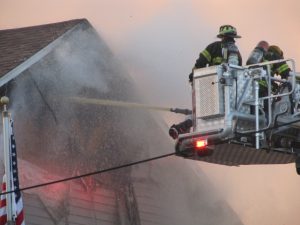
OCEAN CITY – An overhaul of the Ocean City Fire Department’s staffing plan, including new hires and a conversion of some positions from part-time to full-time, was approved this week by resort officials.
During budget deliberations last month, it became evident there was a critical need for more full-time firefighters and paramedics in the resort. Last year, there was a 12% increase in EMS calls in the department’s service area. However, it was learned during budget talks the department was out of crews on 58 occasions.
To that end, the Mayor and Council directed City Engineer Terry McGean and Ocean City Fire Department (OCFD) Chief Richie Bowers to come back with a new staffing plan to meet the department’s growing needs. That plan was presented to the Mayor and Council during Tuesday’s work session.
The proposed plan requests three positions. One is the conversion of the existing part-time training officer to a full-time training officer under the rank of battalion chief. Another is a full-time community outreach and engagement officer, which will also be a firefighter-paramedic that can respond to calls and man shifts. The third is a conversion of a part-time firefighter paramedic to a full-time backfill firefighter-paramedic position.
The revised fire department staffing plan is contingent on the town’s request for federal Staffing for Adequate Fire and Emergency Response (SAFER) grants. The 18 SAFER grant staffing requests are seeking 12 firefighter-EMTs and six full-time firefighter-paramedic positions.
Bowers said as it stands now, the full-time personnel are often being asked to work overtime on long shifts because the part-time personnel, many of whom have jobs with other departments, are not always available.
“We’ve seen an increase in calls for service of around 12% to 15%,” he said. “Our full-time personnel are often held over for overtime and they are ending up with 12-hour shifts or longer. There are times when we have to call them back in.”
For his part, McGean said he worked closely with Bowers and the department’s command staff on the proposed changes and supported the staffing plan as proposed.
“We met and discussed the creation of these requested positions and the conversions from part-time to full-time,” he said. “I am in support of what is being requested here today.”
The cost associated with adding the full-time training officer as a battalion chief is around $54,000, while the cost of a full-time firefighter-paramedic backfill position is estimated at $36,000.
The total cost of all of the proposed staffing changes comes in at over $130,000.
In addition, the proposed staffing plan includes a step salary increase for part-time firefighter-paramedics as an incentive for them to devote more time to the town’s fire department.
The step-two increase would trigger when a part-time firefighter-paramedic reaches a total of 1,500 service hours with the town, according to McGean.
“We have part-time people, but calling them and having them show up are two different things,” he said. “This serves as an incentive for them to show up.”
The step-two salary hike would provide an incentive for part-timers to accumulate the number of hours needed to trigger the increase. The step-two level represents a 5% pay increase, or a total estimated cost to the town of about $40,000. McGean said part-timers might not hit the 1,500 hours needed to trigger the pay increase in the first year, but their hours would accumulate until they reached that threshold.
“It may take a couple of years for somebody to hit that 1,500-hour threshold,” he said. “That’s an incentive to continue to report. It builds up over time.”
Mayor Rick Meehan questioned if the proposed changes would help address the burgeoning overtime within the department.
“Are we going to tackle overtime with this?” he said. “That’s the goal here. I hope we can address that as we redirect the department’s resources.”
Of course, the growing offseason with more and more special events is part of the reason for the increase in calls for service and the need for more and more full-time personnel within the department. On the one hand, growing more special events and expanding the season is creating more revenue for the town through room tax and other sources, but it also creates a strain on town departments including the fire department.
Councilman John Gehrig said the town needed to continue to grow its special events to offset the cost of providing services during them.
“There are more requests coming,” he said. “You have been consistent in keeping us abreast. We’re hiring more full-time people with more salaries and benefits. It has to be paid for and there are limited resources to pay for it. We need to continue to grow events. If we don’t make the money, we’re going to have to raise taxes.”
After considerable debate, the council voted unanimously to approve the Ocean City Fire Department staffing plan as proposed.

